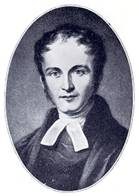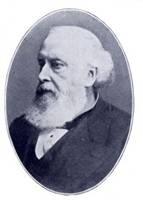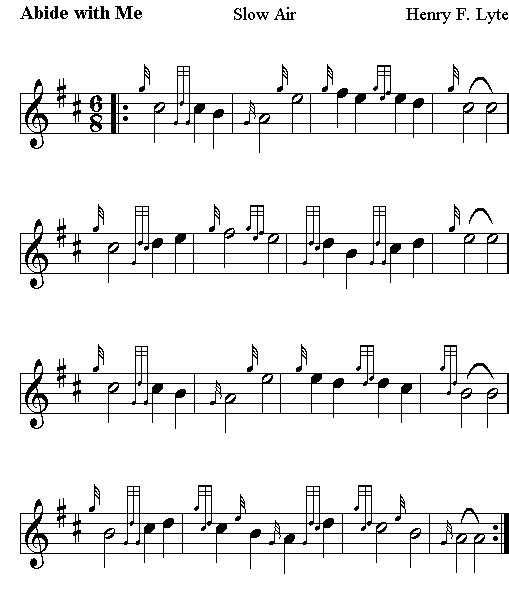
Best viewed in
Internet Explorer
Music (PDF)
Midi
Music (BMW)
Back to

Updated
09/03/2020 |
Abide with Me
|

Henry F. Lyte |
"Abide with Me" is a Christian hymn composed by Henry
Francis Lyte in 1847, though the lyrics are usually sung to
William Henry Monk's melody "Eventide" rather than Lyte's
original music. Lyte wrote the words to his poem while he lay
dying from tuberculosis, and lived only three weeks after its
completion. The song is popular across many denominations, and
was said to be a favorite of King George V and Mahatma Gandhi.
It was sung at both the wedding of King George VI and that of
his daughter, who would go on to become Queen Elizabeth II. It
is also often sung at Christian funerals.
Henry Francis Lyte (June
1, 1793 -
November 20,
1847) was an Anglican divine and hymn-writer. He was born
to Thomas and Anna Lyte on a farm at Ednam, near Kelso,
Scotland. Thomas Lyte deserted the family shortly after making
arrangements for his two oldest sons to attend Portora Royal
School in Enniskillen, County Fermanagh. Anna moved to London,
where both she and her youngest son soon died. |

William H. Monk |
The headmaster at Portora, Dr. Burrowes,
recognized Henry Lyte's ability, paid the boy’s fees, and "welcomed him
into his own family during the holidays. Lyte was effectively an adopted
son, and he never forgot Burrowes' generosity and compassion.
Lyte then studied at Trinity College, Dublin.
He took Anglican holy orders in 1815, and for some time held a curacy in
Taghmon near Wexford. In 1817 he was a curate in Cornwall married to
Anne Maxwell, who came from Monaghan in Ireland. Because of bad health
Lyte moved to England, and after several changes settled, in 1823, in
the parish of Lower Brixham, a fishing village in Devon where he helped
educate Lord Salisbury, later British prime minister.
The members
of the church were husky, hardy, seafaring men; well used to the ravages
of wind and weather. At length it was suggested that a change of
climate would be of benefit, and accordingly, he prepared to move to the
sunny shores of southern Europe. The doctor gave him the grim news that
he had the dreaded 'consumption,' and advised him, 'soak up all the sun
you can; it's your only hope of recovery'.
With more than a heavy heart the Reverend Lyte
prepared for his journey. Now ministers become attached to their
pulpits; and well nigh addicted to the ministry of the Word of God.
Henry Francis Lyte was no exception and so, on the Sunday before he was
due to depart, in September 1847, he ascended the pulpit steps once
more. His people wondered if he would have the strength to stand behind
the sacred desk: or if he would have the voice to speak. However, with
determination he rallied his remaining energies and addressed his
beloved people thus:
'I stand among you today as alive from the
dead, that I may hope to impress upon you to prepare for that solemn
hour which must come to us all, by a time acquaintance with the death of
Christ.'
At home, that
same evening, anguish poured from his grief-stricken soul and in search
of solace he penned the words of his now famous hymn. He died on
November 20th, 1847.

Lyrics by Henry Lyte
|
|
Abide with Me; fast falls the eventide;
The darkness deepens; Lord with me abide.
When other helpers fail and comforts flee,
Help of the helpless, O abide with me.
Swift to its close ebbs out life’s little day;
Earth’s joys grow dim; its glories pass away;
Change and decay in all around I see;
O Thou who changest not, abide with me.
Thou on my head in
early youth didst smile;
And, though rebellious and perverse meanwhile,
Thou hast not left me, oft as I left Thee,
On to the close, O Lord, abide with me.
I need Thy presence every passing hour.
What but Thy grace can foil the tempter’s power?
Who, like Thyself, my guide and stay can be?
Through cloud and sunshine, Lord, abide with me. |
Not a brief glance I beg, a passing word;
But as Thou dwell’st with Thy disciples, Lord,
Familiar, condescending, patient, free.
Come not to sojourn, but abide with me.
Come not in terrors, as the King of kings,
But kind and good, with healing in Thy wings,
Tears for all woes, a heart for every plea—
Come, Friend of sinners, and thus bide with me.
I fear no foe, with Thee at hand to bless;
Ills have no weight, and tears no bitterness.
Where is death’s sting? Where, grave, thy victory?
I triumph still, if Thou abide with me.
Hold Thou Thy cross
before my closing eyes;
Shine through the gloom and point me to the skies.
Heaven's morning breaks, and earth's vain shadows flee;
In life, in death, O Lord, abide with me. |
|




